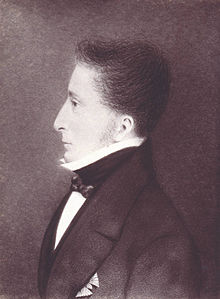John Eardley-Wilmot
John Eardley-Wilmot (born February 21, 1783 in London , United Kingdom , † February 3, 1847 in Hobart , Van Diemens Land (now Tasmania); officially Sir John Eardley-Wilmot, 1st Baronet ) was a British lawyer , Member of Parliament and Vice-Governor of Van Diemens Land.
Life
Wilmot was born to John Eardley-Wilmot and his wife Frances into a family of lawyers; his grandfather was a judge, his father the owner of a law firm . In 1808 he married Elizabeth Emma Parry and, after her death in 1818, Elizabeth Chester the following year . In 1821 he was given the title of baronet . In 1829 he received an honorary doctorate from the University of Oxford , among other things for his writings on the reform of juvenile criminal law.
From 1832 to 1843 Wilmot was a member of the House of Commons , where he soon joined a group led by Edward Stanley , then Minister of War and Colonial Affairs. In 1843 Wilmot was appointed lieutenant governor of Van-Diemens-Land, which the Times newspaper criticized with suspicion of haggling over offices. Wilmot himself always denied that he had tried for the office. On August 17, 1843, he arrived in Hobart without his wife, who had remained in England.
The colony had been in an economic crisis since 1841, which had meanwhile brought many settlers to the brink of bankruptcy and reduced tax revenues considerably. In addition, there was the then new concept of probation , which was to be tested with the prisoners in Van Diemens Land; the prisoners were allowed to take up work after a certain period of time and earn regular wages. This met with strong rejection from the settlers, as they had previously benefited from the forced labor of the convicts. Furthermore, the many criminals living in the greatest possible freedom caused concern; also the number of guards had to be increased, which in turn led to higher expenses. This resulted in the colony being practically bankrupt in 1844. Wilmots achieved financial relief through a series of measures. Wilmot managed to convince the English government to pay for two thirds of the cost of police forces and judicial measures. Furthermore, he cut the expenses of the administration radically.
However , Wilmot was soon very unpopular not only among the settlers, but also in the Colonial Office . He sent only inadequate reports to England about his experiences with the new probation system, and he was increasingly accused of sloppy work. Relations with the settlers reached a low point when negotiations on a new constitution for the colony failed in October 1845. Wilmot was also in dispute with the local bishop , Francis Nixon , over the rights of church and state, especially within the prison camps. Eventually the colonial office became aware of reports of homosexual debauchery among convicts. Wilmot was also assumed to have such inclinations and it was decided that he would be removed.
When Wilmots found out about this in October 1846, he saw himself as the victim of a conspiracy and demanded that a commission of inquiry be convened. He stayed in Hobart to gather evidence, even when his successor, William Denison, took office on January 25, 1847. However, he soon fell ill and died of an unknown disease on February 3, 1847.
literature
- Michael Roe: Eardley-Wilmot, Sir John Eardley . In: Douglas Pike (Ed.): Australian Dictionary of Biography . Melbourne University Press, Carlton (Victoria) 1966–2012 (English).
| predecessor | Office | successor |
|---|---|---|
| John Franklin |
Governor of Tasmania 1843–1846 |
William Denison |
| personal data | |
|---|---|
| SURNAME | Eardley-Wilmot, John |
| ALTERNATIVE NAMES | Eardley-Wilmot, John, 1st Baronet |
| BRIEF DESCRIPTION | British politician, Member of the House of Commons, Lieutenant Governor of Tasmania |
| DATE OF BIRTH | February 21, 1783 |
| PLACE OF BIRTH | London , UK |
| DATE OF DEATH | February 3, 1847 |
| Place of death | Hobart , Tasmania |
